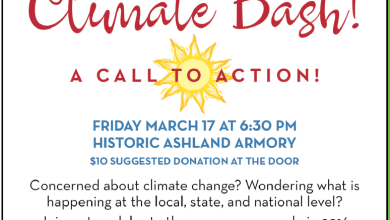Geos Institute
If you have ever had a climate change conversation get away from you, you know how frustrating it can be. Here are three simple concepts that may help.
Climate change is simple. The Earth is warming. We know this because we know that “greenhouse” gases (carbon dioxide and methane, for instance) trap some of the sun’s rays instead of letting them bounce back out to space. And we have known this fact about carbon dioxide, in particular, since before light bulbs were invented.
It’s good that greenhouse gases trap heat because we wouldn’t be here if they didn’t. Having a very thin greenhouse gas “blanket” keeps the earth toasty warm and hospitable to life. And, as with that glass of wine on Saturday night, moderation is key. Enough is enough. And too much is too much.
That thin “blanket” is created by a VERY small amount of greenhouse gases. 350 parts per million is the safety threshold. We passed 400 earlier this year.
Where do these greenhouse gases come from, you ask? There is a natural carbon cycle, so some amount of greenhouse gases are always present in the atmosphere, but the “extra” greenhouse gases that are causing the problem come mostly from us digging up and burning fossil fuels and destroying the world’s forests. And because such a small amount is needed to keep the planet warm, what we are adding makes a big difference.
Climate change is serious. It impacts our families, communities, the natural world, and the wildlife on this planet. An increase of just a few degrees has serious consequences. Hotter global temperatures translate into more unpredictable and extreme storms, droughts, heat waves, loss of snowpack, and sea level rise. Those impacts, in turn, disrupt economies and create greater need for emergency services and medical care. Plants and animals that cannot adapt quickly enough to changing conditions will go extinct in large numbers. We are already seeing some of these impacts here in the Rogue Valley.
Climate change is solvable, if we act now! And we don’t need to wait for technological advances to do it. The good people at Stanford analyzed technologies that are already commercially available at scale. Their conclusion? We already know what to do to drastically reduce global warming pollution. We just need to do it.
Now for the really good news. Leaders around the world are engaging their communities to reduce global warming pollution and the catastrophic impacts of climate change. People are on the move, including here in Ashland where Geos Institute is helping city government and the community develop a Climate and Energy Action Plan. Get involved at: http://bit.ly/AshlandCEAP. And, join your neighbors in taking action at home and work by visiting: www.AshlandClimateChallenge.org.
Geos Institute is an Ashland-based organization that helps local leaders and natural resource managers develop climate change solutions that work for people and nature, address the causes and impacts of climate change, and endure over time. Visit us at: www.GeosInstitute.org


